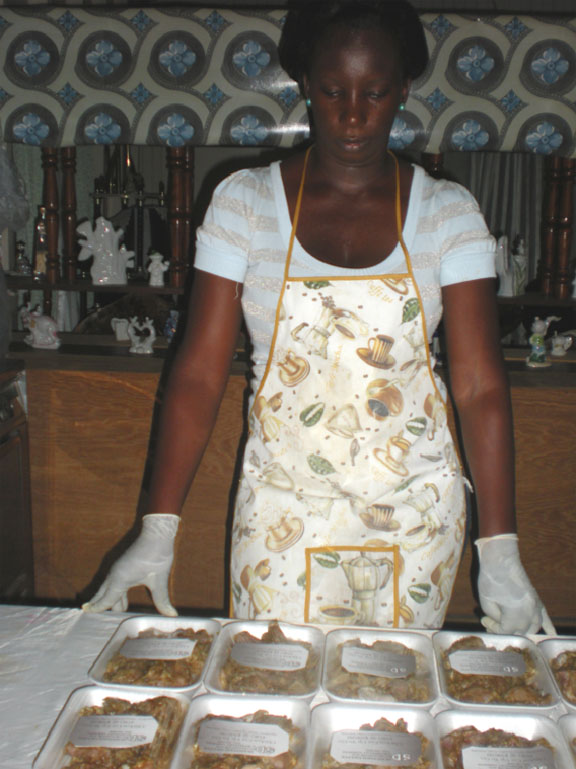Onika Beckles’ preoccupation with completing a degree in Economics at the University of Guyana (UG) is matched only by her fixation with ensuring the social, material and intellectual welfare of her five-year-old daughter.
Her academic responsibilities place strict limits on her options as far as paid employment is concerned. That is a challenge that she has had to face since she started UG three years ago. Having spent much of her time contemplating the kind of gainful employment that would fit in with her pursuits as a single mother and a university student she is currently pursuing an idea which she believes might just work.
Beckles’ choice of a means through which to secure a steady earning seeks to take advantage of a Guyanese preoccupation with elaborate food preparation. Many of our dishes – curries, stews, souse, pepperpot and a host of others – have made their respective names on account of the particular condiments and seasonings used in pre-preparation. Beckles believes that over time she has become sufficiently proficient at seasoning meats and fish to engage in this particular pursuit as a commercial endeavour.

She says that it was February this year while she was seasoning meat for herself that the idea of turning the art into a commercial venture struck her. Her initial target market, she thought, would be professional women who might welcome the idea of being spared of what is sometimes seen as a time-consuming chore. During a period of contemplation and consultation with relatives and friends, however, it occurred to her that she might access a much wider market to include households that may simply not be versed in the particular art. Her first attempt at marketing the idea appeared on the Facebook page of broadcaster Gordon Moseley. The responses, she says, were “encouraging”.
Eventually, she persuaded herself that she had secured a marketable idea. There was only one problem; she had no money with which to get the initiative off the ground. Support in that regard came from the likeliest source, her mother and her biggest fan, Ingrid Barron. Having sold her mother the idea Beckles benefited from a gift of $20,000. Her initial purchases included several pounds of fish and chicken. She remembers her first sale too, to a friend named Shondel Johnson.
Seasoned Delights, the trading name she has chosen for her enterprise is usually the outcome of long hours of painstaking work. Beckles says that contrary to what some people might imagine seasoning meat is about much more than simply “mixing things together”. She says “some meats lend themselves better to certain seasonings; actually, seasoning is the essence of cooking.”
She is careful in her acquisition of fish and meat, visiting the Meadow Bank Wharf frequently to acquire fresh fish. Her purchases of chicken, beef and pork are done equally methodically.
The seasoning itself is an elaborate process. The spices and herbs she employs are a mixture of the indigenous seasonings: eschallot, thyme, basil, celery and the others and those spices that are acquired in the supermarkets. Garlic, she says, is a must for some meats.
The pursuit of seasoning meat requires a physical environment which takes full account of health considerations. Apart from having acquired a Food Handlers Certificate, Beckles operates from a squeaky-clean kitchen. Her meats are handled only when necessary. Marinating is the essence of the process. In sum, the secrets to Beckles’ seasoning process are no secrets at all. They are a combination of tips from her mother’s kitchen and her own culinary ingenuity. In the final analysis, she says, “it must taste like what it is meant to be.”
There are no limits to what she offers. Fishes and meats are seasoned for stews, pepperpot, curries, barbecue, garlic pork and other popular creole dishes. Those apart, she is willing to experiment with whatever else the customer might want.
Business is moving at only a modest pace, but she is satisfied that the initiative is off the ground. Seasoned Delights has received some measure of publicity on the internet and marketing, u
p to this point, is primarily a word-of-mouth pursuit. Modest family orders for seasoned meat are gradually growing into orders from offices and Beckles hopes she can eventually attract orders from working women who simply do not have the time for elaborate food preparation. While she engages in limited pre-packaging of seasoned meats and fish she favours responding to specific orders.
While price fluctuations mean that what she charges must be adjusted from time to time, she seeks, she says, to keep her prices “reasonable”. Currently, she offers Banga Mary at $300 per pound and Butter Fish at $400 per pound. Snapper is offered at $1,000 per pound. Seasoned chicken for curries or stews is currently sold at $500 per pound, while the same meat, seasoned for baking, is sold at $600 per pound.
Beckles is careful not to get ahead of herself. She plans, in the period ahead, to utilise a portion of a family plot on the Soesdyke/ Linden Highway to cultivate some of the seasonings she uses. She keeps an open mind in the matter of her future. Seasoned Delights, she says, may well be around long enough to benefit from what she hopes will be the training which she is currently receiving to become an economist.





